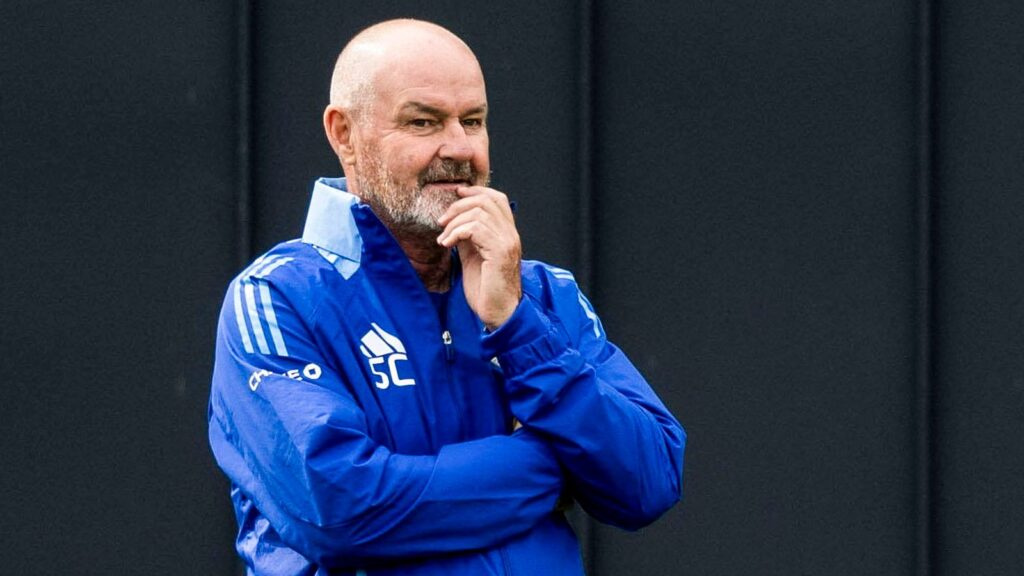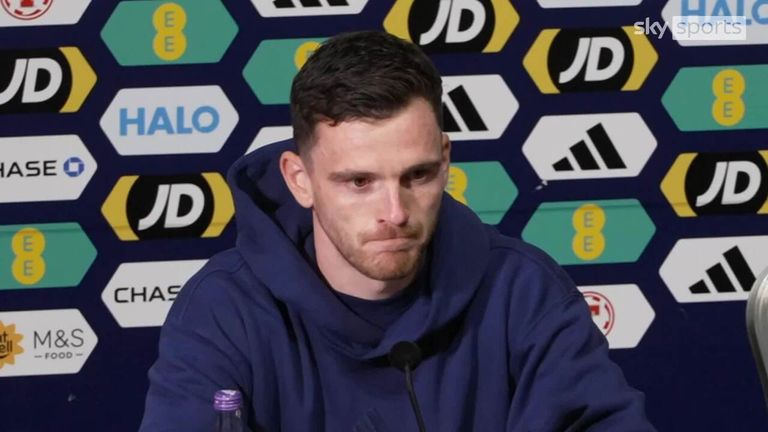“We’ve got another very, very good thing that we can achieve together.”
Understated as ever, Steve Clarke is refusing to get caught up in the nerves and hype of Scotland being potentially on the verge of qualifying for the World Cup for the first time since 1998.
The task against Denmark on Tuesday night is simple – win and a place at next summer’s tournament is guaranteed. If not, they have a play-off in March to fall back on.
Clarke, who is out of contract at the end of this campaign, has already led the national side to back-to-back European Championships and is hoping to go one better this time.
“I’d like to go to the World Cup with my country,” he said as he confirmed Billy Gilmour would miss the match after failing to recover from injury.
“I think if you look at what we’ve achieved over the last six and a half years, a lot of these players are already, I’ll use your words, ‘legends’, he said.
“But they’re already very, very high in the ranking of what we’ve done as a country.
“When I took the job six and a half years ago, a lot of people were saying, don’t touch it, it’s a poison chalice, you can’t do this.
“I looked at the group of players and I said, I see some quality there. I look forward to working with this group of players because I think we can achieve good things.
“We’ve managed to do that. Now we’ve got another very, very good thing that we can achieve together.”
Scotland’s unbeaten run in Group C ended on Saturday with a 3-2 defeat in Greece, but Denmark’s 2-2 draw with Belarus means it is a winner-takes-all clash at Hampden Park.
“I’m expecting their heads won’t be down, because they also still have the opportunity to go through as group winners,” added Clarke of the Danes, who they drew with in Copenhagen in September.
“They’ll come here determined to make amends for their slip-up the other night.
“We’re determined to make sure that it’s another difficult night for the Danes and a great night for us.
Clarke: ‘I believe they’re good enough’
More than half of Clake’s squad were not born when Scotland last qualified for a World Cup, while 42-year-old goalkeeper Craig Gordon will likely be the only player to remember watching France 1998.
“If they’re not nervous or excited by the challenge ahead, they wouldn’t be at this level,” the former Kilmarnock manager added.
“They understand the magnitude of the game and what it means. But they just have to prepare for a game of football and make sure that they’re focused on how we want to play.
“If they go out and play as they can play, then I believe that they’re good enough to get the result that we need.
“There’ll come a time in the game where maybe you have to be a little bit more adventurous to chase the game if you need to win it. Then you have to be careful you don’t lose it.
“If you’re going for a draw, you probably get towards the end of your game and you’re thinking, we need to shut up shop a little bit, which is also dangerous. We know what we have to do and hopefully we can do it.”
‘We need the crowd’
Hampden Park is sold out for the match, with the head coach urging the Tartan Army to back the players throughout the game.
Scotland did not always get a positive atmosphere in their other two home games. They were booed by some fans at half-time in the visit of Greece and were outplayed for about an hour before triumphing 3-1.
Some even jeered after a 2-1 victory over Belarus.
“We need the crowd. We need the crowd with us,” the 62-year-old added.
“You probably need the crowd more in the difficult moments than you do in the easy moments when you’re on top of the game.
“I think if we all work together, we can make it a great night for the country.”
Collins: ‘Nothing comes close’
John Collins was part of Scotland’s World Cup squad in 1998:
“Nothing equals it. Nothing at club level equals representing your country.
“Walking out of that tunnel at a major tournament, standing in the line, the national anthem’s being sung, Tartan Army’s singing it in the background.
“You’re there. The world audience is watching you. Game on.
“It’s gold dust. Nothing comes close.”
How do play-offs work?
The 12 group runners-up will participate in the play-offs, along with the four best-ranked group winners of the 2024/25 UEFA Nations League that did not finish their European Qualifiers group stage in first or second place.
The 16 teams that enter the play-offs will be drawn into four play-off paths, with four teams in each. Play-off matches will be played in single-leg semi-finals, followed by single-leg finals within the same international window in from March 26 to 31 next year.
How many European teams will qualify?
In total, 16 UEFA nations will qualify for the 2026 World Cup. The 12 group winners qualify directly for the World Cup; the four remaining berths are determined by play-offs involving the 12 group runners-up.
World Cup 2026 European qualifiers schedule
Final group-stage match dates: November 13-18, 2025Play-off match dates: March 26-31 2026Final tournament dates: June 11 to July 19 2026
When and where is the 2026 World Cup?
The 2026 FIFA men’s World Cup takes place from June 11 to July 19, 2026.
The tournament will take place across 16 cities in three North American countries: the United States, Canada and Mexico. It is the first time a World Cup has been hosted by three nations.
The last time North America hosted the tournament was in 1994, when Brazil triumphed after beating Italy on penalties.
An expanded World Cup will feature 48 teams – 16 more than in Qatar 2022 – and take place across three host nations for the first time.
World Cup 2026 schedule
Group stage: June 11-27
Round of 32: June 28 to July 3
Round of 16: July 4-7
Quarter-finals: July 9-11
Semi-finals: July 14-15
Third-place play-off (‘Bronze final’): July 18
Final: July 19








